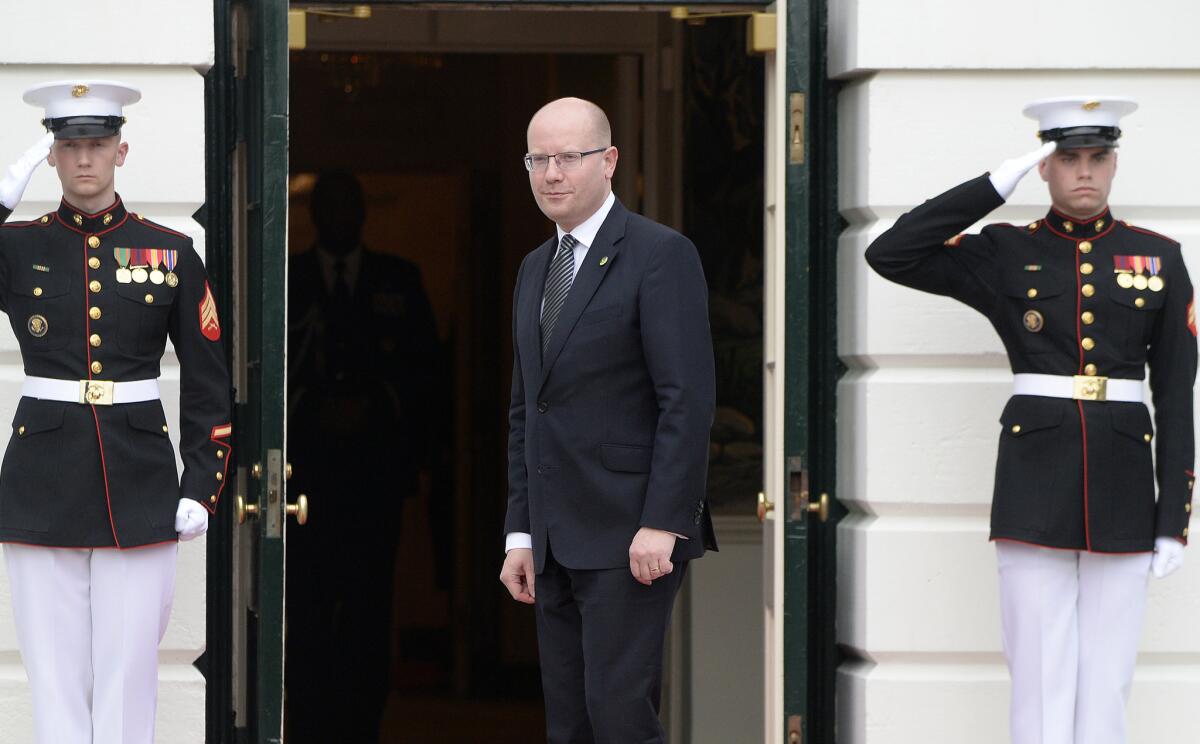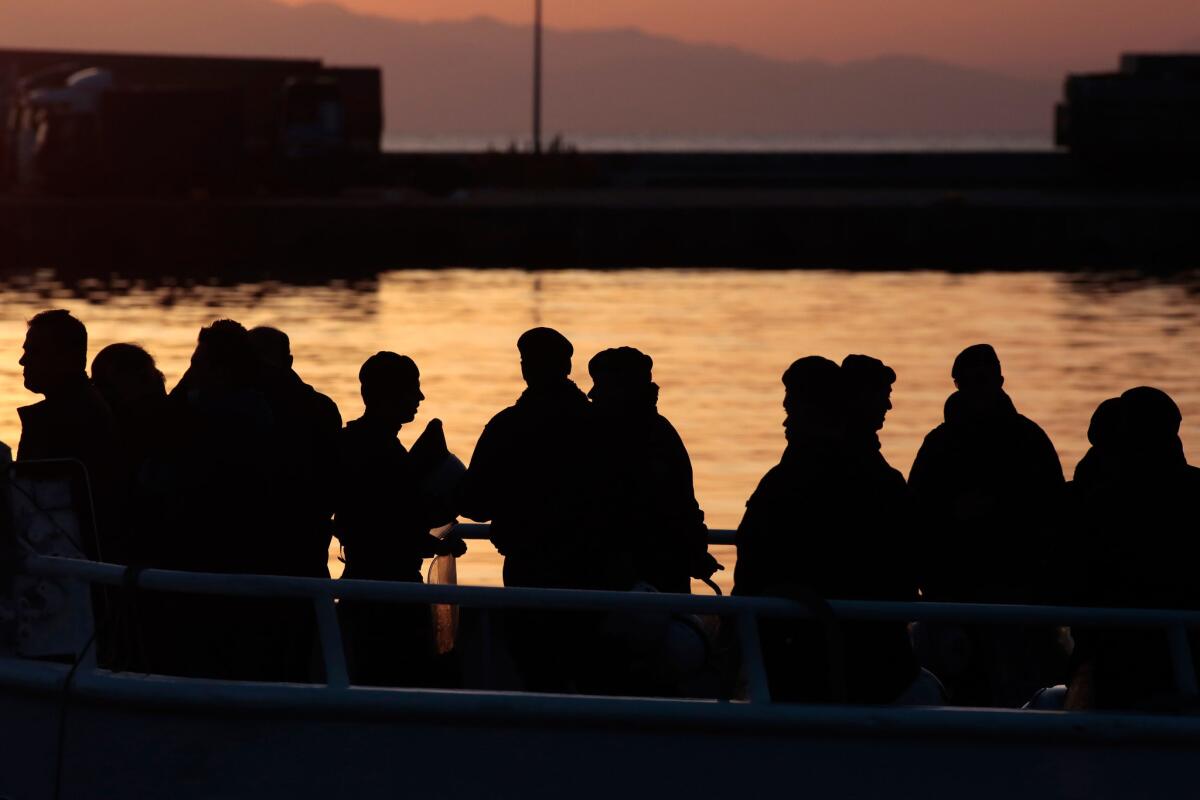Migrants, terrorism and risk of breakup are straining Europe, Czech prime minister says

Bohuslav Sobotka, prime minister of the Czech Republic, arrives at the White House on March 31.
- Share via
The strain of the migrant crisis, the threat of terrorism, and the risk of European breakup are among the challenges facing the 28 countries of the European Union, including the Czech Republic.
The central European nation has agreed to accept a quota of migrants despite resistance from many of its citizens including its president, Milos Zeman, who has described the movement of refugees into Europe as “an organized invasion.”
The Czech prime minister, Bohuslav Sobotka, though initially skeptical about the scheme to share about 160,000 asylum seekers among EU bloc members, has expressed support for providing humanitarian assistance to those genuinely fleeing war and persecution.
But he also underscores that providing a safe haven to migrants fleeing war-torn Syria will not ultimately solve the problem.
“The cause of the migration crisis lies in Syria and the solution lies in Syria as well,” Sobotka said during a recent discussion at The Times.
He pressed the need to resolve the political crisis in Syria, end the conflict there, and help establish stability throughout the Middle East.
The migrant crisis laid bare Europe’s inability to adequately control its borders. Sobotka has called for more stringent border regulations that ensure that only those with a legitimate case for asylum are allowed to enter.
Regaining full control of its borders and curbing the number of legal European migrants allowed to work in the United Kingdom are among the issues fueling the campaign for Britain to exit the EU, a move that Sobotka believes would weaken Europe as a whole.
The Czech Republic, he said, supports a package of changes the United Kingdom would get to its EU membership if Britain votes to remain in the union during a referendum scheduled for June.
The deal, which Sobotka described as “a kind of compromise,” includes Britain’s ability to limit certain benefits for EU migrants during their first four years in the United Kingdom.
Speaking through a translator, the prime minister expanded on some of his views:
How has the Czech Republic been impacted by the migrant crisis, and is it possible for refugees to integrate into Czech society?
The refugee crisis decreased people’s support for the European Union because in the first months, the European Union was really not able to handle the refugee crisis properly.
What makes the integration of the refugees challenging is three-fold.
First of all it’s the fear of [the terrorist group] ISIL. It is the recent terrorist attacks as well as the experience of poor integration of immigrants in the past as far as Europe is concerned. It was demonstrated that some of those attacks were actually organized by people who were born in Europe in the immigrant Muslim communities. You can actually see a trend of radicalization of the second or third generation of Muslims who actually are already settled in Europe. So people are skeptical about successful integration of people of Muslim background into Europe or into our environment, which is largely secular or Christian. But there are still many people who understand that one should really help the refugees of war.
Also, let me stress in this context that for the past few years we actually integrated more than 100,000 migrants from Ukraine and we managed to integrate them very well. But those were people from an environment that is very close to us, culture-wise and religion-wise. So the integration of Muslims is an objective problem and we are in need of positive examples.
At the start of the migrant crisis it almost seemed that Europe had lost control of its borders. What needs to be done?
Obviously, we need to reestablish control over who really comes to Europe. People with no papers, with no documents, with no IDs, people who are clearly not refugees of war should be stopped. So far it has not been functioning that way. But in the next weeks we will start the process of returning refugees from Greece to Turkey.
We need to also have controls in place and processes in place to regulate the influx of war migrants. It cannot be chaotic. We [need] a joint European border as well as coastal border patrols. We also need to find an agreement with other countries, neighboring countries, on the rules of returning the refugees. When [a refugee] comes to Europe and asks for asylum, he will not receive asylum for not having complied with the conditions for asylum. We want to have an instrument or means to return those people.
What is your position on the prospects for peace in Syria and what is your government doing to help?

Police escort migrants, who are being deported from Lesbos, Greece, onto a ferry bound for Turkey.
The Czech Republic has been maintaining and preserving its functioning embassy in Damascus throughout the whole period of the conflict. We represent the interests of both the United States of America as well as the European Union. The Czech Republic is also active in providing humanitarian aid to people in Syria and also in providing help to refugees in Syria, Lebanon and Turkey.
As for Syria, we really have to look for a broader agreement that has to also involve people who represent the Assad regime. I realize that for a final peaceful solution in Syria sooner or later, Assad will have to leave.
Also, I believe that the basic preconditions for achieving this broader consensus is primarily the agreement between the United States and Russia. We need good coordination amongst all the key players in the region. If the key players will continue going at each other they will not be able to resolve their differences, then peace is not achievable. Obviously, what is also of equal importance is preserving the territorial sovereignty of Syria as well as Iraq.
What are the implications of the possible exit of the UK from the European Union and specifically what impact might that have on the Czech Republic?
The Czech Republic supports the UK remaining a member of the European Union. If the UK decides to leave the Union it will weaken both the EU and the UK If the UK decides to exit then it will give ammunition to the nationalists and extremists. Our government strongly supports the membership of the UK in the union.
It’s not really about economy purely, but also about the strategic importance, value and strength of Europe. Let me also stress that there’s a real need for a strong partnership between the EU and the United States of America.
For more news on global sustainability, go to our Global Development Watch page
And follow me on Twitter @AMSimmons1
MORE WORLD NEWS
Bangladeshi surfer girls go against the cultural tide
‘My God. We’ve done this’: Meet the reporters who probed the Panama Papers
Taiwan charges 5 people for apartment tower collapse in deadly February quake
More to Read
Sign up for Essential California
The most important California stories and recommendations in your inbox every morning.
You may occasionally receive promotional content from the Los Angeles Times.










